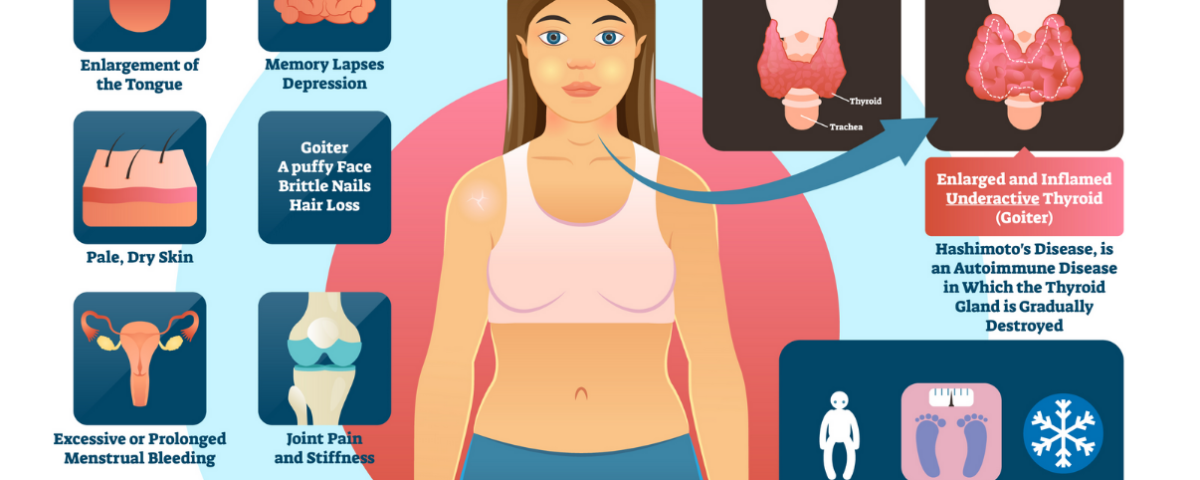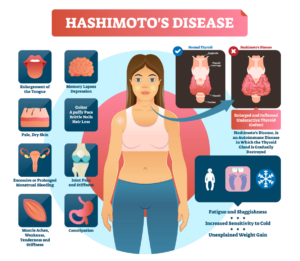


Many friends and family members talk to me about thyroid function, some discuss that they have been ‘diagnosed’ with hypothyroid or Hashimoto’s. This is the main reason for this month’s newsletter/article is to investigate the most recent research in the subject. After doing initial searching on some of my favorite search engines and subscriptions (UptoDateOnline.com, NCBI and CINAHL). I found some relevant points to share and new studies to explore.
Firstly, Hashimotos thyroiditis is the most common autoimmune thyroid condition in the western world, affecting mainly women1. This disorder is of the immune system, where our immune system makes antibodies that tag our own cells of the thyroid gland for destruction, in some cases our thyroid cells are programmed to die (apoptosis)2. Due to this, the thyroid does not function properly or is unable to release appropriate levels of thyroid hormones needed for normal body function. Infection, stress, reproductive hormones, pregnancy, iodine intake, and radiation exposure are the known possible precipitating factors for Hashimoto’s thyroiditis2. Hashimotos Thyroiditis causes hypothyroidism or lack of circulating thyroid hormones. Which can be problematic as they affect the function of virtually every organ system in the body, but most specifically are correlated with bone development, cardiac gene expression and metabolism regulation3.
Most people diagnosed with this disorder have to take hormone replacement in order to maintain normal levels of thyroid hormones in the blood for the rest of their lives. Some studies show that even with hormone replacement women are STILL suffering with symptoms like weight gain, poor sleep and reduced quality of life4. That means that even though some women will take medication for the rest of their life, they will not see much improvement. I don’t know about you, but if I am paying for medication and taking it every day, I would want it to work. However, one new pilot study I found suggests that diet and lifestyle changes can significantly improve one’s quality of life, reduce pain and clinically reduce inflammatory and immune responses in the body (which can be associated with the causes of Hashimotos)5.

Most of us know that eating well can help us stay healthy but did you know that healthy eating has the potential to change the way your cells react in the intestine? I found some enlightening information about how the intake of dietary fiber. Fibers found in green vegetables, some oils and fish allow for the creation and secretion of short chain fatty acids in the intestinal flora6. This can be associated with the reduction and prevention of inflammatory bowel disease and some autoimmune diseases and can also aid in repairing tissues in the intestine6.
A recent article which reviews the often-marketed suggestions of iodine and selenium supplementation for Hashimotos Thyroiditis. The authors have clinically revealed that selenium which is highly anti oxidative and anti-inflammatory could be beneficial in patients with adequate iodine intake but was not suggested as a supplement as it can be toxic at high levels7. Proper nutrition and balanced dietary intake are more than adequate to achieve the optimal levels of Selenium and Iodine7. Supplementation should be closely monitored due to the potential of toxicity. They also review that celiac disease and autoimmune thyroiditis are so closely correlated that any patient with either would benefit from gluten free diet.
I am certainly not suggesting that if you change your diet you will be rid of Hashimotos forever. However, the science is suggesting that you could significantly reduce your symptoms and prevent further cardiovascular and inflammatory disease if you stick to a diet regimen that is high in dietary fiber and balance.
If you would like to know the specifics of this diet or if you have questions about your health, please subscribe to the monthly health advice at www.vitalityhealthsolutions.org and find the solutions to your health concerns.
Thank you for reading,
Kaley Johnson
RN BN MN CNC
References: